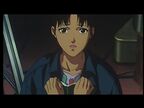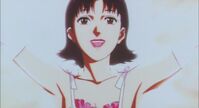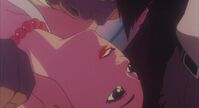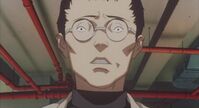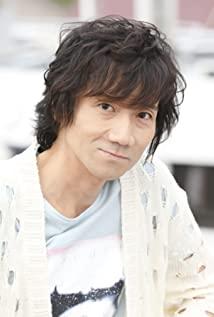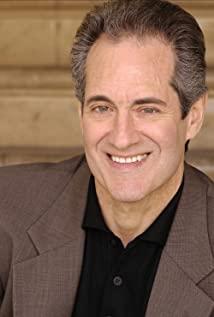Today Mincai passed away early, leaving behind four films ("Millennium Actress", "Red Pepper", "Tokyo Godfather", "Mima's House") and one drama ("Delusional Agent"). The four films are very different in style. "Millennium" has a thin story (conceptualized love), but uses constructive audio-visual language to tell the story (matching editing, cross-axis transitions are very well played), and its theme is a never-ending pursuit. . "Red" has almost exhausted the expression techniques of animation and even image language to satisfy the free roaming of imagination. The distorted time and space and the creative full-point pornographic lens are full of impact, but the overall impression is that form is greater than content. "Tokyo" is a work that tends to be realistic. Some people say that this work contains what Jin Min really wants to express, but perhaps it is because those people prefer realistic themes, so they emphasize the importance of this work. "Delusional Agent" is an absolutely rare drama. From the plot to the revealing of the suspense, the conception is exquisite and the logic is rigorous, and it is not boring to play it several times. However, my favorite among Jin Min's works is "Weima". Although this is only an animated film, I personally think it is better than David Lynch, David Fincher, and Darren Aronofsky. etc.'s works are even more brutal ("Gone Lover" is brutal, but not as deep as "Weima").
After reading "Weima", my heart was as painful as after watching "Farewell My Concubine", I fell into a black hole and couldn't extricate myself; I was as crazy as after reading "Disqualification in the World", I can't wait to live as an inspiration . Last fall, I wanted to write something about "Weima". It wasn't a serious film review, but I couldn't write even a casual look, maybe because the cruelty was too real to bear. This kind of mental anatomy that points to myself with the help of Wei Ma, I feel that I am enough when analyzing Dieyi, Dieyi is too beautiful and fantasy, a vision of integrating art and life that is not crazy or alive is supporting me, but When I got to Wei Ma, I broke down. But just yesterday, I finally decided to write something, in between philosophical mind gymnastics. The form and style of the images in "Weima" are amazing, but these issues are left for the film class to sort out. Here we only focus on the thought itself.
Cruelism is never presented as a simple yellow violence in "The House of Weima", but serves the analysis of people's hearts. If you are willing to have a deep operation on your heart, the depth of the pain may not be so abstract. In this work, Jin Min presents an amazing introspection. There is no self-deception or self-pity here. There is only a kind of pain in the skin, but the pain is not over yet. You can't indulge in the dark kingdom of the soul all the time, you must be brave Stand up, clench your fists and walk towards the light. "Weima" involves a large number of people with split personality, and there are at least three people with split personality problems. Compared with many movies, it is enough to use "numerous" to describe it. It is still necessary to take a look at the problems inside first.
Question 1: Does Me-Mania really exist?
An open interpretation should be allowed, so I imagine three answers: A.Me-Mania is just Weima's fantasy; B.Me-Mania is real; C.Me-Mania is both Weima's fantasy and reality keeping it.
Answer A is based on reasons that seem logically justifiable. "Weima" emphasizes the "eyes of others" (gazing, others are hell) felt by Weima's subjective standpoint, and these eyes have become a reflection of her delicate and sensitive inner world. When Wei Ma was a member of Cham, he felt the "eyes of others" that were embraced by everyone on the stage; the "eyes of others" he felt on the set after he transformed into an actor was not valued and recognized on the set; after Weima went solo, Cham The other two members have "other people's eyes" that are contemptuous for her superficial kindness; the obscene and greedy "other people's eyes" that are directed towards her flesh during the filming of rape scenes and nude photos, and so on. However, Me-Mania is another component of "Other's Eyes", he is the hero of Weima, that is, he is the guardian of Weima, the phantom idol, after Weima gradually develops a personality disorder It is actually a mental placebo for Wei Ma.
When Me-Mania made his first appearance, as a security guard and a loyal fan of Weima, he beat up the "star trio" who came to make trouble at Cham's farewell concert. Although we can't say for sure that Me-Mania's first appearance is Mima's hallucination (because the phantom's idol Mima has not made his debut at this time), we have reason to speculate that after the farewell concert, Me-Mania Mania is largely just a hero that Wei Ma imagined. Here's why: Me-Mania's many close-ups after the farewell show (especially when viewed from Mima's point of view) seem to be shrouded in a black shadow, which seems to imply that the person doesn't actually exist. Me-Mania occasionally sees Me-Mania on set (either in a corner, or next to the camera), but in a blink of an eye the person has disappeared without a trace. More powerful evidence is that when Mirage Weima asked Me-Mania to rape and kill Weima, Weima returned to the murder scene and found that there was no one there: no one named Me-Mania was killed by his own fighting back and lay in a pool of blood. middle. Me-Mania is a hero that Wei Ma fantasized about for his own spiritual redemption. If he just maintained law and order at the farewell concert at first (this may not be Wei Ma's fantasy); then he seriously injured Doi Zheng (18-year-old Farewell to the show rioters), bought all the nude photo magazines to defend the "pure" idol Mima, the phantom's accidental Mima turned to Me-Mania for help, hoping that he would kill the "tainted" Mima, which It's possible that the events of the series are just Mima's fantasy. She couldn't accept her transformation from idol to actor, she hated herself as an actor too much and missed herself as an idol too much, so she fantasized about the hero Me-Mania guarding the idol Weima and killing the actor Weima.
However, there are still some doubts in this understanding: Before studying in the United States about to expose the symptoms of split personality to Weima, when Weima called Tiansuo, Tiansuo and Me-Mania were lying next to each other, covered in blood. This plot seems to imply that the two go through a life-and-death struggle and then die together. In this way, Me-Mania seems to be a real person, and from the mouth of Liumei, who also has dual personalities, there seems to be some kind of intersection between Liumei and Me-Mania (of course, this intersection may also be just fantasy of staying in the United States) because she claims to have instigated Me-Mania to murder Weima. Therefore, if the factor of personality split in the United States is considered, Me-Mania may also be the hero of the fantasy of studying in the United States, but we still have no sufficient reason to rule out the possibility that Me-Mania is a real person, so answer B cannot be ruled out. However, if the person is treated as real, then the person should be suffering from schizophrenia, i.e. he has auditory and visual hallucinations of the phantom idol Weima, in other words, he is in fantasy with the phantom. Idol Mima conducted various communications. There are only two details that conclusively indicate that Me-Mania was Weima's hallucination: between Weima's "first awakening" and "second awakening," Me-Mania flashes on set and then disappears; Me-Mania attempted to rape and murder Weima. But apart from these two details, Me-Mania involved in other places may be a real person, or it may just be a fantasy of staying in the United States or Weima, so answer C is also possible .
Question 2: Who has multiple personalities?
We have already mentioned above that if Me-Mania is real (except for the two episodes that can prove that he is a fantasist), then he should also be a schizophrenia (Schizophrenia), note, not a dissociative personality disorder or Multiple Personality (Dissociative Identity Disorder, or Multiple Personality Disorder). Me-Mania's schizophrenia is expressed as: I am Me-Mania, and I am also the guardian of idol Mima. This split was caused by his inability to accept that the "pure" Weima was "tainted". The split enabled him to escape the reality of Weima's transformation and live in a beautiful longing for his idol Weima (his spiritual comfort). , and even intends to protect the purity of the idol Mima in his heart by killing the actor Mima. Me-Mania created a phantom idol, Mima, to ask him for help through visual and auditory hallucinations. This fantasy is actually a manifestation of his self-conflict: on the one hand, he hates the actor Mima; on the other hand, he misses the idol Mima. Hemp; and disgust and attachment are like action and reaction, which complement each other.
In the United States, unable to accept the transformation of Weima's acting career, she split the phantom idol Weima from within herself. Liumei's dissociative personality split (please note that it is not schizophrenia, but personality split) is expressed as: I am Liumei, and I am also an idol Mima. The multiple personalities of staying in the United States were only revealed near the end of the film, but they were strongly related to the seemingly calm layout before, so it was not abrupt, but a surprise. At the beginning of the film, Liumei, as Weima's manager, held an objection to Weima's abandonment of the song, and she expressed her strong resistance in many negotiations with Mr. Tiansuo, but she could only suppress herself because things backfired. In the film, the experience of studying in the United States is explained lightly: she was once an idol, but she did not realize her dream of performing arts, and later became an unknown agent without decision-making power. In the entertainment industry where Liumei and Weima are located, it may not be difficult to obtain the aura of an idol, but it may also bring restrictions or obstacles to practitioners, because for many people, "idol" is just a synonym for "vase", it seems In addition to the glossy appearance, there is no connotation to be tapped, they are just men's sexual stimulants. The star dream of studying in the United States is over (the film does not explain why), but the fire of hope to become an idol has not been extinguished. Her sense of lack of her failed acting career has been psychologically compensated by the idol Weima before the transformation. . For Liumei, guarding her idol Mima is equivalent to guarding her idol dream. She even arranged her room to resemble the idol Mima's room. However, after Wei Ma turned into an actor, especially after filming rape scenes and nude photos, the idol dream in Liu Mei's heart was completely destroyed by Wei Ma. A way of self-salvation is not to directly face the reality that this idol dream has been broken (this reality is difficult to face, and it is obviously easier to avoid and transfer the problem. Many times, humans who avoid bitterness and sweetness will instinctively choose the latter) , but the idol Mima who split the phantom from within herself so that she can continue to carry her idol dream and let her continue to dream. "Double After the completion of Bind", studying in the United States will take Weima to his home and put on a red dress in order to kill Weima, all of which seem to show that studying in the United States cannot accept the fact that Weima's transformation. Her self-conflict is the same as Me-Mania (on the one hand, she hates the actor Wei Ma; on the other hand, she is extremely nostalgic for the idol Wei Ma), and the way to solve the self-conflict is to let the phantom idol Wei Ma (another personality of Liu Mei) kill the actor Wei Ma. numb. Until the end of the film, when Wei Ma, who has been recognized in the film and television industry, went to a mental hospital to visit and study in the United States, Liu Mei still could not get out of the dilemma of multiple personalities. Her personality would occasionally return to studying in the United States, but many times she would consider herself an idol Wei Ma. , This self-identification is the ultimate way to stay in the United States to protect your idol dream.
On the one hand, Wei Ma complies with Mr. Tian Suo's idol transformation plan, but on the other hand, she is very skeptical and even resists this transformation. Extreme self-repression makes her split the phantom idol Wei Ma from within herself. Wei Ma's dual personality is expressed as: I am the actor Wei Ma, and I am also the idol Wei Ma. The phantom idol, Mima, made her debut when she was alone on the subway in Greater Tokyo and saw it through a car window after Mima agreed to take on the rape scene (Kim Min subtly uses subway windows, car windows, mirrors, computer screens, etc.) etc. presents Wei Ma's mirrored personality for the media). Mima herself has a desire to transform (she talked about this on the phone to her mother, although her tone was not very reluctant), but this desire is mostly caused by the external world's prejudice against idols, her original intention (Hidaka Liumei: "She came to Tokyo to sing") is an idol, but because she cares about "other people's eyes" (the idol market is sluggish, Mr. Tiansuo "can't make money from selling records", Mima doesn't want to cause trouble ), so I also hope that I can go beyond the status limit of idols, expand myself, and gain more and higher recognition. However, her sense of loss was heightened when she learned that Cham had gotten better results after her solo flight (never in the top 100 in the past, but now at 83): not only did the idol's " "Halo" makes it difficult for her to be recognized and recognized as an actor (she must sell her hue to get a chance), and even as an idol she was only dispensable.
After filming the rape scene, Wei Ma was sitting in the dressing room dressed in black. It seemed like nothing had happened, but it actually implied that the idol Wei Ma was dead (Jin Min also talked about this, in fact, I am a bit concerned about the director's interpretation of his work Conflict), black represents a funeral of self. Wei Ma just filmed a rape scene, that is to say, she was not actually raped, but she was raped mentally. Mental rape is more fundamental than physical rape, because it is possible that even physical rape does not necessarily lead the victim to believe that his soul has also been raped (this claim presupposes the separation of spirit and flesh, and is Physicalist natural attitude draws the line), although physical rape is often accompanied by spiritual rape. Weima was raped in the spotlight and in front of the camera: a stripper (Yoko Takakura played by Weima) was raped by a lewd man in front of the crowd on the dance floor; actor Weima (as an actor) was raped by actors, Rape by "the eyes of others" by the director and the audience. But in the final analysis, Wei Ma’s rape was essentially a kind of self-rape. She allowed herself to be raped by “the eyes of others”, that is, she was raped voluntarily. “voluntary” and “raped” seem to be contradictory, but this happens to be the case. It is the concentrated expression of Wei Ma's inner conflict. Therefore, the actor Wei Ma in the TV series "Double Bind" is not "playing" rape, but a real process of being raped. Someone asked me before if the rapist's penis actually entered the body of the rapist during the filming, and I thought the question was not important because the rape had already happened on a spiritual level anyway. When Wei Ma returned home humming a little song, the more normal she showed, the more abnormal she became (she is a typical repressive personality). This tension-filled foreshadowing and the subsequent emotional explosion were very smooth. The first close-up about the fish tank in the whole movie is not long after Wei Ma turned into an actor, and after returning from shopping in the supermarket alone, he said to the fish (more than two) in the fish tank, "I'm sorry, I forgot to feed you today"; When she comes home after a rape scene, she finds that all the fish (more than two) are dead; and after her emotional outburst, Phantom's idol Mima tells her "it's disgusting work" and then The camera cuts to the fish tank with two goldfish swimming in it. Here, the gist of the whole film has been given - the war between the two Wei Ma officially kicked off. Jin Min broke through Wei Ma's psychological structure with the help of the psychiatrist of "Double Bind": "The memory of the ordinary girl who was raped in the strip theater, everything became the plot in the play, this kind of The transfer gave her redemption." In "Double In Bind", Takakura Yoko killed top model Takakura Rika and identified herself as Takakura Rika (Yoko's sister), which saved Takakura Yoko; similarly, actor Mima killed the idol Wei Ma thus identified himself as an actor. Takakura Yoko said "yes, I'm a model" is equivalent to Mima saying "yes, I'm an actor".
However, in fact, Wei Ma killed only the former idol Wei Ma (she tried to erase the memory of the idol Wei Ma), but could not kill the phantom idol Wei Ma, so there was bound to be a war between the two Wei Ma. . After the rape scene, Wei Ma's clothes changed, from the past color to a dark color, and she was very mature when she was interviewed. Phantom's idol Weima rebuked the actor Weima: "You have been defiled", "You can no longer return to the halo of idols", "I am the light, you are my shadow". When Mima and Mr. Tiansho discussed Shibuya's death, they looked sorry and sad; but when Mima, the phantom idol in the taxi coming from the other direction of the tunnel, said "he did it by himself", please pay attention Ma's mouth shape was also changing. "He did it by himself" was obviously speaking from another self who was over-repressed in Wei Ma's heart. In the nude photo shoot, Jin Min edited the Cham duo's performance scene and Weima's nude shooting site in parallel. The huge contrast between the two scenes corresponds to the huge conflict between the two selves in Weima's heart.
Next is the confusing "four awakenings". Jin Min simmered dreams, hallucinations, reality, and the plot of TV dramas. This kind of "simmering" requires a deep understanding of people with split personality. It will lead to a series of interpretations that try to logicalize this anti-logical "chaos" clip. However, I think that even if we can find some sporadic logical correlation from the anti-logical "four awakenings", this does not mean that it is necessary to provide a logical and clear answer for the "four awakenings" Yes, the rationalization-seeking explanation of imposing a causal relationship on two events or phenomena is exactly psychological or mechanistic (maybe the text I'm writing is just as boring, love the movie so much), but When we discuss issues in the abyss of human hearts, logic alone is not enough, and logic is probably just a cut of "chaos". The first time I woke up, before waking up, it was the scene of Wei Ma chasing the phantom and Me-Mania driving a truck into him. The time to wake up was 7:05 in the morning on a certain day in July. The news content was related to the "New National Life Indicators". After studying in the United States to visit, Wei Ma began to admit the existence of another self: "Maybe that is the real Wei Ma, another self hidden somewhere in the bottom of my heart". The second time I woke up, the time was still at 7:05 in the morning of a certain day in July, the news was still about the "New National Living Indicators", and when she came to visit the United States, Wei Ma could no longer distinguish between reality, dream and fantasy: "Is yesterday the real yesterday? "Is this blood real?" Wei Ma could only know her daily whereabouts through the diary posted on the website. The same news was playing on the TV during the first and second awakenings, which seemed to indicate that at least one of the two awakenings was not real. The third time I woke up, at 9:05 a.m. on a certain day of a certain month, Weima woke up from a dream that murdered photographer Murano. Tiansuo called to inform Murano of his death. Weima found a blood-stained courier suit in the closet. Wei Ma asked, "Am I really still alive? Maybe I've been hit by a truck and I'm just living in a dream?" The fourth awakening was in the TV series "Double Bind". Ma's has a more complex dissociative personality disorder than both Rumi and Me-Mania, and she is split not only in real life (actor and idol Mima's confrontation); The person who plays Takakura Yoko is also a split personality, a split personality plays a split personality, and there is no need to act at all). "Yoko Takakura has become a character in the TV series" is equivalent to saying "Mima has already appeared in the TV series "Double"
After the completion of "Double Bind", Wei Ma returned to the locker room alone, but was accidentally attacked by Me-Mania, but as mentioned earlier, this attack was probably just Wei Ma's fantasy. Rumi then takes her back to her home (the train is outside the window, and there is a poster of the Cham trio on the wall), and appears as the phantom idol, Mima, and tries to kill the actor Mima. While the two were chasing and fighting, a truck came, Wei Ma rescued Liu Mei, the two fell unconscious, and then Wei Ma gradually opened her eyes, which seemed to indicate that all the wars had subsided. Here's a question: How did the struggle between actor Wei Ma and Phantom's idol Wei Ma (both a split personality who stayed in the United States and a split personality of Wei Ma) be reconciled through a car accident?
Question 3: Who is the murderer?
Despite the intricacies of the characters and plot in the movie, it is not that difficult to understand if you have the clues. As mentioned earlier, there are three people involved in mental or personality splits: Me-Mania (if you don't think of him as a mere fantasy of Weima or Liumei), Liumei and Weima. The three of them split out the phantom idol Weima from within themselves, that is to say, the phantom idol Weima was shared by the three of them. The idol Mima came to save himself from the cruel reality. For Me-Mania and Liumei, the phantom's idol, Mima, is a spiritual sustenance and spiritual comfort; for Mi-Mania, the phantom's idol, Mima, is a deeply repressed self.
In fact, the clue to understanding the murder in reality has been revealed by Hitomi Asamiya in "Double Bind". The police asked: "Is the murderer a phantom that she constructed? But the phantom can't kill people"; Asamiya replied: "But what if the phantom found an incarnation? All crimes are committed by her other personality." Comparing this to reality, we can see that all crimes are committed by the phantom idol, Weima. The target of this phantom is all those who have contributed to the transformation of Weima's acting career, and this phantom incarnation can Any of the three of them.
1. Who called Wei Ma? Who sent her the threatening fax?
At this time, Wei Ma has not yet experienced the first appearance of the phantom, so she is still in the incubation period of split personality, and it may be Liumei or Me-Mania who call and send faxes. I suspect that the reason for staying in the United States is: from the beginning of studying in the United States, it made a clear statement against Wei Ma’s transformation plan; and according to common sense, compared with Me-Mania, studying in the United States as Wei Ma’s agent is more likely to know Wei Ma’s address, phone number and fax. Please note that there is a shot of Wei Ma looking out of the window after she received the "traitor" fax. The camera zooms out and a train is speeding by; at the end of the film, when Wei Ma wakes up from a coma, before she goes to the United States to hunt down Wei Ma I found out that this is not my room, and a train was passing by when I opened the curtains, so it is very likely that the person who has been peeping at Weima is Liumei, and her room is opposite to Weima's room (the window of Weima's room is opposite to train, the window of the room in the United States is facing the train). The reason for the suspicion of Me-Mania is that he mostly appears in the film as a voyeuristic, stalking fanatic and other pathological images, so it is not impossible to know Wei Ma's private information through peeping, stalking, etc.
2. Who sent the detonating letter to Wei Ma at the filming site of the TV series?
Although it was Mr. Tiansuo from the office who was injured, in fact this letter is likely to be aimed at actor Mima. If the detonation letter is aimed at Tiansuo, then transfer the letter to Tiansuo on the set (because Weima is busy filming) and Tiansuo will definitely open the letter by himself. personal letters), more likely to stay in the U.S. than Me-Mania. There is also strong evidence that Liumei is the murderer. When Liumei installed a computer for Weima and instructed her to surf the Internet, Weima asked about the explosion letter, but Liumei's reaction was obviously unreasonable, because she went too far. Her indifference is in stark contrast to her usual thoughtful care for Weima. And Liumei also said: "Don't worry, it's just a prank." How could you know that it was a "prank" if it wasn't the murderer, or if you didn't know the origin of the bombing letter?
3. Who was Doi seriously injured by?
Jin Min explained that Doi was injured through the poster in the elevator. The only person in the film who has a head-on conflict with Doi is Me-Mania, so the person who seriously injured Doi is likely to be Me-Mania, and at this time he is obviously not a fantasy of Weima, because the idol of the phantom is not yet. First appearance. Me-Mania's serious injury was to protect the idol in his heart, Wei Ma, and when Wei Ma saw the news of the serious injury in the elevator, he probably gradually developed a sense of psychological dependence on Me-Mania, so it was logical that he was in a split personality. Fantasy hero Me-Mania protects idol Mima. However, although the film does not imply that there is any intersection between Rumi and Doi, it cannot completely rule out the possibility that she is the murderer.
4. Who created "Weima's House"?
The creator may be studying in the United States, or it may be Me-Mania, but Weima is excluded. Wei Ma got the website address from a fan letter she received after saying goodbye to Cham.
5. Who writes a complaint diary on the website?
The diary in "Weima's House" claims that Weima was under intimidation and coercion to shoot rape scenes and nude photos. Although we cannot determine whether the person who wrote the letter was Me-Mania, Liumei, or Weima, we can be sure , these diaries were written by Mirage's idol, Mima, in order to fight against the actor Mima, who has been "tainted". It is possible to write these diaries in the United States. As Weima's manager, she is very familiar with the details of her acting work, so it is not difficult for her to write these diaries. Of course, these complaint diaries may also have been written by Weima herself. After all, at this time, she has already entered the struggle of dual personalities, so that she herself is not sure which one is the real herself: "Maybe that is the real me. The real Mima, another me hidden somewhere in the bottom of my heart", when this hidden self acted without authorization, it is likely that these diaries were written. Of course, the suspicion of Me-Mania cannot be ruled out. If he is a fan of Weima's stalking fan, he may also know Weima's whereabouts and work details, and then write a complaint diary to protect the idol Weima.
6. Who killed Shibuya?
The murderer may be Me-Mania, or it may be studying in the United States, or it may be Wei Ma. Regarding Shibuya's death, Toshiyoshi gave few details: the time of death was 1:00 a.m.; the weapon was similar to that of Murano who was subsequently killed when he was attacked. Doctor Asamiya in the series "Double Bind" has made it clear that all the crimes were committed by another personality of Takakura Yoko, so Shibuya was killed by the phantom idol Mima (the tape recorder in the elevator before the murder played). Cham's song), and the avatar can be any of the three. But if we consider the characteristics of the murder weapon, the suspicion of Liumei and Weima is greater than that of Me-Mania, because when Murano was killed, the suspicion of Liumei and Weima is greater than that of Me-Mania, which we will talk about below.
7. Who is the murderer who killed Murano?
The suspicion of staying in the United States and Weima is greater than that of Me-Mania. The reason for thinking that it was to stay in the United States is that during the murder process, the camera occasionally implied the murderer's body shape as Liumei, and the picture switched between the body shape of Liumei, the body shape of Wei Ma, pornographic photos and Buddha statues, which seemed to indicate that the murderer was another part of Liumei. The first-level personality is the phantom's idol, Wei Ma, and when the camera switches to the scene where Wei Ma wakes up after the murder ("the third awakening"), it seems to imply that Wei Ma just committed a murder that is exactly the same as the actual murder in the United States. dream. However, Wei Ma's suspicion is still very high. She woke up (the date of "the third awakening" is unknown, only know that it was 9:05 in the morning) and soon after learning about Murano's death, she found the courier in her closet at the time of the murder. Clothes. Of course, the evidence of the murderer may also have been kept in the closet in the United States, because after Wei Ma's "first awakening" and "the second awakening", Liu Mei came to visit the delirious Wei Ma in the morning. Aware of Weima's split personality, so he blamed Weima for the crime, set Weima as the murderer, and even Weima himself would believe it. But here we still need to think about such a question: How can a person with split personality (staying in the United States) be aware of the split personality of others (Weima)? At the filming site of the TV series, Mima saw that the actor who played the murdered person turned into a bloody Murano and suddenly woke up. This seems to mean that, just like Yoko Takakura killed a certain man, Mima probably thought it was herself. Killed Murano, but whether she killed him in a dream, or transformed herself into Takakura Yoko and killed him in the TV plot, or killed him in reality, Jin Min did not give More clues for reference.
8. Who wrote the SOS letter to Me-Mania?
It may be studying in the United States, it may be Wei Ma, and it may even be Me-Mania herself. Liumei may have learned about Me-Mania's contact information through some channel, hoping to use Me-Mania's hands to kill the "dirty" actor Weima, which is confirmed in what Liumei said to Weima later: " Since Mr. Me-Mania has failed, let me kill you", this sentence seems to indicate that there is some connection between studying in the United States and Me-Mania. Of course, it is also possible that Weima herself wrote to Me-Mania. Her idol Weima, another phantom of her personality, hopes to use Me-Mania to kill the "stained" actor Weima, which is actually Weima's Self-loathing and self-abandonment, but mediated through Me-Mania. Weima was attacked after the filming of "Double Bind", and these are likely just her fantasies, her fantasies about Me-Mania helping her end this "dirty" self. It's also possible that Me-Mania wrote herself a distress letter. Unable to bear the reality of Mima taking nude photos, he bought as many nude magazines as possible and fantasized about his idol Mima asking for his help: "I am me, always with you, that impostor always gets in the way Me", Me-Mania replied "I will protect the real Mima". During this process, he used the phantom idol Mia as an intermediary to write to himself, in order to play the heroic role of the idol Mania's guardian. Of course, the analysis here is similar to the previously discussed Me-Mania's split personality structure. conflicted.
9. Who killed Me-Mania Wadasho?
In the United States, Wei Ma took Wei Ma to his home (Weima thought he was going back to his home). After Wei Ma woke up and found that the situation was abnormal, he called Tian Suo, and the camera switched to Me-Mania and Tian Suo died together. There is a speculation that, when Weima was changing, although the rape and murder attack she encountered was actually just an illusion, Me-Mania did exist and was ready to kill the actor Weima (at the request of Liumei, who was also completed). his own wish), but unfortunately met Tian Suo, so they both died after fighting with Tian Suo. Another possibility is that Me-Mania does not really exist, and Liu Mei killed Tian Suo while he was changing clothes.
10. Who attacked Weima?
The one who attacked Weima was Mirage's idol, Weima, and since this phantom was shared by Yumei and Weima (Me-Mania is dead), this chase was both Weima's attack on Weima and Weima's self-attack. .
Summary: Death or Rebirth?
As mentioned above, Rumi (Phantom's idol Mima) attempted to kill Mima (actor Mima) not only murder, but also Mima's suicide. The two suffer from dissociative personality disorder and even share the same personality, but why are their outcomes so different? Why is Wei Ma able to transcend the split personality and move towards self-reconciliation, while studying in the United States is forever trapped in the split personality?
The film gives an important message, that is, Wei Ma rushed to save her when Liu Mei was about to be hit by a truck. this point is very important. Because it shows that even in the predicament of split personality, Wei Ma still retains the last trace of kindness and sobriety. The kindness is reflected in the fact that even if she is chased by Liumei, she still chooses to save Liumei's life in turn; sober is shown in that she can at least be aware of the danger of life itself when a car accident is about to happen (but before Weima "first wakes up". She didn't realize this in her dream, and Liu Mei, who has a split personality, didn't realize it in front of the truck). But further, if we look at studying in the United States as a phantom idol, Weima, we will find that what Weima really wants to save is the phantom idol Weima. This rescue is exactly what the actor Weima and the idol Weima can do. The key to reconciliation, in other words, because Mima still retains her last goodness and sanity (she went one step further than Rumi), she can break free from the purgatory of self-conflict and be reborn. Salvation is essentially a kind of self-help, which to a certain extent may be the instinctive reaction of people, or the embodiment of vitality. It does not even have anything to do with kindness and reason, that is, Weima’s vitality is stronger than that of Liumei. In the situation where the Me-Mania imagined by Weima replaced the idol Weima raped and murdered the actor Weima, and finally Weima killed Me-Mania in a Jedi counterattack, why did Weima kill Me-Mania in the fantasy, not Me-Mania killed Wei Ma? Perhaps it is because Weima is not willing to go towards complete self-destruction, so this is also a kind of self-salvation of Weima. In many cases, destruction or rebirth is just a matter of thought.
If we look at the problem of split personality without tinted glasses, split personality is just a neutral phenomenon. It is difficult to say that it is a mental or psychological disease, but most people have not yet reached a certain level of splitting. They think they are healthy and normal, but in fact, the "madman" in their eyes is just taking their internal conflicts to the extreme. There is no qualitative difference between them and the "madman" but only quantitative, and the extreme In itself is brewing a profound. For Me-Mania and Leumei, the split has only a negative meaning, it's just their way of escaping reality: for Me-Mania, the split is the road to death; She can only live as a living dead. Blindly choose to escape, and the division (the sanctuary of reality) will always exist. For Weima, however, the split has a positive meaning: it is this split that has contributed to Weima's self-reconciliation and awakening. Jin Min seems to present the spiritual growth history of the self in the empirical sense through Wei Ma, from identity to division to unity, from thesis to antithesis and then to synthesis, the process is very painful, but as long as the vitality is strong enough, dare to face the dripping With blood, we can all embark on a path of spiritual transformation. Studying in the United States only means a stage and a link in Weima's spiritual development process. As Weima said: "It is because of her past that I have my present." The phrase "I am the real me" she said when she went to visit the United States is full of suspense in the eyes of many people, but I prefer to interpret it as Wei Ma who has completed a self-mental birth at a higher level The self-identification of “I am who I am” (A=A), a self-return. In "I'm the real me", both the subject "I" and the predicate "I" encompass actor Mima and idol Mima, and these conflicting selves are reconciled and internalized on a higher spiritual level For a segment of "I". Childbirth in the natural sense is that the mother gives birth to us, but the self-birth in the spiritual sense is that we achieve self-breakthrough and renewal by constantly sublating and surpassing ourselves: a new "I" is the dialectical unity of the opposites of the self and the self. body. By denying himself, Wei Ma surpassed his own directness and obtained his own indirectness, and then returned to his own directness in the spiritual movement. The reason why Wei Ma's split personality did not lead to self-destruction like Me-Mania and Liu Mei was because Wei Ma's "self-exploration" drive did not stop her from staying in the United States (Li Mei was forever stuck in a pool of despair. stagnant waters), but a constant self-transcendence, this transcendence
"Who are you?" Wei Ma asked herself, this is a question related to the identity of the personality, so the self-exploration begins, the exploration will not stop, we are always on the road to find ourselves. At the beginning of the film, a virtual game of war between the three righteous people who guard the peace of the online world and the king of loopholes is introduced, which is not an arbitrary arrangement. The dazzling dreams, reality, fantasy and the free shuttle of the plot presented throughout the film are actually the true portrayal of Wei Ma's inner world. Which one is the real me? Me in fantasy, me in dream, me in TV series, or me in real life? Where is the border between the virtual world and the real world? Isn't the virtual also a reality? Isn't what "I" see, hear, feel, know, think, etc. in each world all equally real? In fact, every "I" is real, because the first-person subjective feelings of "I" are actually happening to the "I", whether in a virtual way or in a real way.
"The House of Weima" shows the complex psychology of people's various self-protection and self-rescue when facing the difficult reality. Isn't that what you have to go through in order to be reborn? Only by facing the reality and bearing the pain can we grow up, let ourselves live in a dynamic field, and live out the freshness and tenacity of life. I admire Jin Min. In my opinion, his works are more delicate, rich and profound than many European and American psychological films. If he is still alive, I believe he will bring us more surprises, because his genius His sharpness and mastery of genres are really commendable, and his spiritual temperament is even more agile and open, full of tenacious vitality and infinite potential.
Autumn 2016 Guangzhou
View more about Perfect Blue reviews



